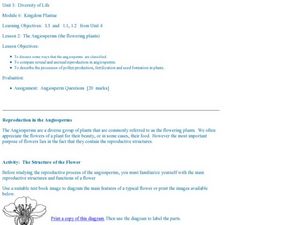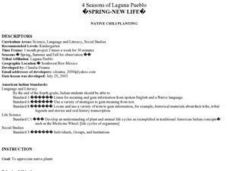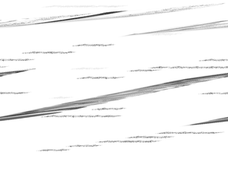Curated OER
Bean Project (Activity in Response to the Book Jack and the Beanstalk)
In this literature and science worksheet, students respond to the book Jack and the Beanstalk by planting their own beanstalk. Students gather the 5 necessary tools and follow the 5 directions for planting a bean seed in a pot.
Oklahoma State University
Hairy Heredity
Young scholars learn that heredity comes down to the flip of a coin with this cross-curricular math and science lesson. Using smiley faces as a model, young scholars toss coins to determine which dominant or recessive...
Curated OER
Grow Your Own
Students study the growth and care of plants. They take tour of their school site and plant seeds to observe their growth. Afterward, they answer questions about the origin and value of their plants.
Curated OER
Our Friends or Foes
In this living organisms worksheet, 6th graders choose the multiple choice answer to 10 questions. Students then read and answer 10 statements as true or false and fill in the blanks to 5 statements.
Curated OER
Tree Identification/Tree Art
Seventh graders identify and examine a deciduous and coniferous tree. Using the descriptions, they discover the types of tress in their local area. As a class, they practice identifying trees on a walk in a park collecting leaves. They...
Curated OER
The Angiosperms
Students study angiosperms and their classifications. In this investigative lesson students compare the sexual reproduction of angiosperms and seed formations.
Curated OER
Grow a Plant
Young scholars combine their prior knowledge about plants with a garden learning activity. In this science gardening lesson, students discuss what plants need to survive. Young scholars then plant a seed themselves and demonstrate...
Curated OER
Native Chili Planting
Students discover the process of planting chili. After comparing two types of seeds students plant and with the use of a digital camera, record the seed progress. When ready for transplant, students take young plants to a retirement...
Curated OER
Fruits and Vegetables
Students explore the differences between plants with seeds and seedless. In this fruits and vegetables lesson students examine some vegetables and nuts that are really fruits.
Curated OER
It's Just Dirt
Students discover how seed germination varies according to the soil type. In this soil science lesson, students discuss what plants need in order to grow and investigate various types of soil. Students use their senses to describe each...
Curated OER
The Living Environment
For this living environment worksheet, students complete a crossword puzzle given 34 clues about the various species in the environment that produce, consume and decompose. Topics also include photosynthesis, respiration, glucose,...
Rainforest Alliance
My Forest or the Rainforest?
The differences between tropical and temperate rainforests range from animals and flowers to climate and landscapes. Kindergarteners compare and contrast characteristics of their local forest to a tropical rainforest.
Curated OER
Pollination Power
Second graders study and examine the structure of a flower. In this pollination instructional activity, 2nd graders observe pollinators in the garden and dissect a flower. Students then plant strawberry plants in the garden and...
Cold Spring Harbor Laboratory
Genes Don't Blend
Yellow and blue make green—unless you're studying the inheritance of genetic traits. An interactive lesson explains the difference between blended traits and pure traits and gives examples of their occurrence. The resource includes a...
Desert Discovery
Life Cycle of the Saguaro
Third graders make books which illustrate the growth and development of a saguaro cactus from its beginnings as a seed all the way through its death. They trace the life cycle of the saguaro, identify each of the stages in its life,...
G. Turrell
Science Activity 1: Light & Sound
Are you looking for lab sheets to go with your class experiment on plant response to light? You are no longer in the dark! This is a lesson that was written for a unit on light, but could easily be used to demonstrate plant behaviors in...
Curated OER
Can You Make a Muscle?
Why are muscles important? Third graders study the different kinds and functions of muscles in the human body. After drawing arrows in an illustration to indicate where a muscle contraction would occur, they do their own experiment about...
Curated OER
Recyclers to the Rescue
Producers, consumers, food chains, and plants are the stars of this science lesson. Learners take part in an inquiry which helps them to discover the most effective and efficient way to grow a producer. They have a variety of containers...
Alabama Learning Exchange
WATER You Doing to Help?
Auntie Litter is here to educate young scholars about water pollution and environmental stewardship! Although the 15-minute video clip is cheesy, it's an engaging look at the water cycle and conservation. Learners start by illustrating...
Curated OER
Rain Sticks
Artists of all ages construct a three-dimensional form and fill it with rice to make gentle, percussive sounds. They discover that Native South American tribesmen would harvest dead branches from cactus plants, fill them with small...
Alabama Learning Exchange
Good Litter, Bad Litter
Which ones can be thrown on the ground? Discover the difference between natural litter and unhealthy trash, helping scholars by using several examples. Use the information here to give them a basic background, but also encourage prior...
Curated OER
Form and Observation
Use a familiar song and adorable baby animal pictures to teach youngsters about genetic variation. Begin by listening to "Twelve Variations on 'Ah vous dirai-je Maman,'" which you will need to find online (there are several versions...
Curated OER
Our Playground!
First graders observe and explore the playground's environment by walking around the playground, followed by a group discussion of what they observed. They then divide into groups and participate in centers, their brought back together...
Rainforest Alliance
Growing a Rainforest in Our Classroom
Give your classroom decor a boost with a rainforest themed mural highlighting what class members learned through their five senses—taste, touch, see, smell, and hear. Scholars create a rainforest filled with trees and animals using their...






















